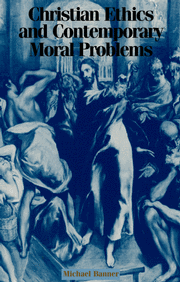Book contents
- Frontmatter
- Contents
- Preface
- Acknowledgements
- 1 Turning the world upside down – and some other tasks for dogmatic Christian ethics
- 2 Christian anthropology at the beginning and end of life
- 3 The practice of abortion: a critique
- 4 Economic devices and ethical pitfalls: quality of life, the distribution of resources and the needs of the elderly
- 5 Why and how (not) to value the environment
- 6 On not begging the questions about biotechnology
- 7 ‘Who are my mother and my brothers?’: Marx, Bonhoeffer and Benedict and the redemption of the family
- 8 Five churches in search of sexual ethics
- 9 Prolegomena to a dogmatic sexual ethic
- Bibliography
- Index
6 - On not begging the questions about biotechnology
Published online by Cambridge University Press: 21 May 2010
- Frontmatter
- Contents
- Preface
- Acknowledgements
- 1 Turning the world upside down – and some other tasks for dogmatic Christian ethics
- 2 Christian anthropology at the beginning and end of life
- 3 The practice of abortion: a critique
- 4 Economic devices and ethical pitfalls: quality of life, the distribution of resources and the needs of the elderly
- 5 Why and how (not) to value the environment
- 6 On not begging the questions about biotechnology
- 7 ‘Who are my mother and my brothers?’: Marx, Bonhoeffer and Benedict and the redemption of the family
- 8 Five churches in search of sexual ethics
- 9 Prolegomena to a dogmatic sexual ethic
- Bibliography
- Index
Summary
The Report of the Committee to Consider the Ethical Implications of Emerging Technologies in the Breeding of Farm Animals (hereafter the Banner Report), seeks to address the questions raised by the application to animals of the broad range of techniques of biotechnology.
Such a sentence, for all its seeming innocence as a factual description of the Report, will doubtless trouble philosophically minded readers. Those who have been brought up After Virtue, so to speak, can hardly fail to be aware that amidst the moral fragments of western thought no questions about biotechnology are straightforwardly ‘the’ questions about bio-technology. Maclntyre's sequel to After Virtue asks Whose Justice? Which Rationality?, and here we might echo the point by asking ‘whose questions?’ The heirs of Aristotle, Thomas Aquinas and Descartes will, for example, with their different views of animals, ask different sets of questions of the new technology.
The Banner Report can be distinguished from certain related reports, so I shall argue, in that it shows itself to be aware of what we might term the embeddedness of questions in metaphysical and moral theories. Naturally, it takes a view as to what questions are raised by biotechnology as regards, for example, the status and protection of animals, but it does so quite consciously and with a degree of argument appropriate if not for philosophers, then at least for Government Ministers to whom the Report is addressed. To be specific, the Report challenges the tendency to assess the new technologies solely in terms of questions of risk and benefit, and contends that this tendency uncritically privileges a particular philosophical position.
- Type
- Chapter
- Information
- Christian Ethics and Contemporary Moral Problems , pp. 204 - 224Publisher: Cambridge University PressPrint publication year: 1999
- 1
- Cited by



